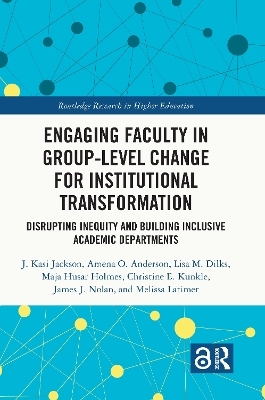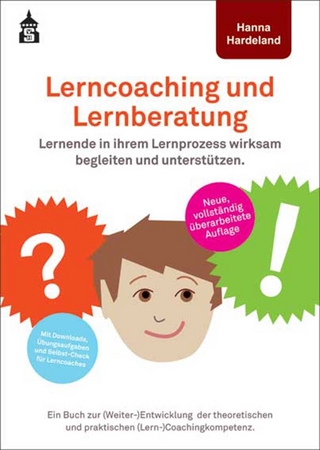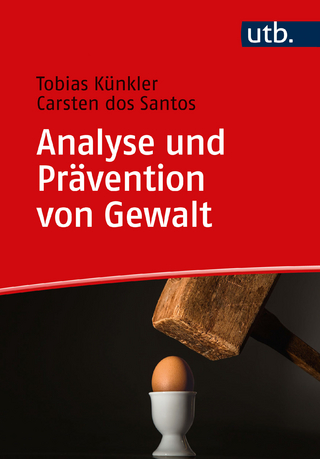
Engaging Faculty in Group-Level Change for Institutional Transformation
Routledge (Verlag)
978-1-032-21108-4 (ISBN)
Efforts at institutional transformation continue to center individual actors. This is evident in the proliferation of programs that train individuals on implicit bias, search strategies, and other diversity and inclusion-based content as solutions for inequities in academia. Acknowledging the value of these approaches, this book adds a new focus: group-level processes. It unifies research on gender and racial inequity with concepts from social psychological theories of group dynamics to present a model of change centered on professional adult learners, including faculty and academic staff. The book details the implementation of group-level processes based on insights from the learning sciences, higher education leadership, communication studies, and group facilitation to instill norms for a more equitable and inclusive institution. Drawing on quantitative and qualitative data to illustrate the impact of group-level initiatives, the book offers recommendations to enable the application of this model in higher education contexts.
This book will be of interest to researchers and graduate students studying institutional transformation, academic social justice leadership, and faculty professional development and to those interested in integrating justice and equity into team science, translational research, and other trans-, inter-, and multi-disciplinary fields.
Chapter 2 of this book is freely available as a downloadable Open Access PDF at http://www.taylorfrancis.com under a Creative Commons [Attribution-Non Commercial-No Derivatives (CC-BY-NC-ND)] 4.0 license.
J. Kasi Jackson, Ph.D. Director, WVU ADVANCE Center; Professor, Women’s and Gender Studies. Sharing information and resources, Kasi nudges the WVU ADVANCE Team out of their comfort zone and into action. Amena O. Anderson, Ph.D. Assistant Director/Assistant Professor, WVU ADVANCE Center. Amena brings a critical higher education leadership perspective to the Team and guides equity-promoting professional development opportunities. Lisa M. Dilks, Ph.D. Director of Undergraduate Studies, Associate Professor, Sociology. Lisa, utility player extraordinaire, translates data into formats that help the Team measure the impact of their work. Maja Husar Holmes, Ph.D. Associate Professor, Public Administration. Maja’s expertise in organizational facilitation shaped the Team’s initial work. An integrationist, Maja glues the Team to their core principles and emphasizes action. Christine E. Kunkle, Ph.D. Associate Professor, Communication Studies. Christy’s magnetic approach to engaging with people and ideas and her scholarship on intergroup communication drive the successes of the Team. James J. Nolan, Ph.D. Professor and Chair, Sociology. Jim’s scholarship generates change in individuals and groups. Showing empathy, listening intently, and enriching others are at Jim’s heart. Melissa Latimer, Ph.D. Associate Provost, Faculty Development and Culture; Professor, Sociology. Melissa is a Jedi Master Team Builder. As a listening leader, Melissa synthesizes every members’ contributions. Additional Contributors Malayna Bernstein, Ph.D. Assistant Professor, Director, Learning Hub, Faculty of Information, University of Toronto. Powerful and empowering, Malayna collaboratively designed and facilitated the Change Agent Course for faculty and staff. Susana Mazuelas Quirce, Ph.D. Education Senior Research Analyst. With a holistic and human approach to solving educational challenges, Susana combines practical intelligence with a systematic skill at finding information. Presha E. Neidermeyer, Ph.D. Professor, WVU, Business and Economics. Presha brings a feminist leadership perspective to the Team. Presha is compassionate, practical, and amplifies the Team’s value.
Introduction: The WVU ADVANCE Team—Harnessing Group Energy Part I: Centering Group-Level Processes to Drive Institutional Transformation in Higher Education 1. Centering Group-Level Change Processes: An Elixir for Dual Agenda and Intersectional Approaches 2. Group Psycho-Emotional Dynamics as Central to Effective Institutional Change: Connecting Individual and Whole-Institution Approaches 3. Group Psycho-Emotional Dynamics within Academic Departments: The Structure, Process, and Impact of Dialogues™ Part II: Two Models for Group-Level Change: Dialogues and the Change Agent Course 4. Experience of Dialogues™: Facilitator and Participant Responses to Implementing the Theory of Change 5. Application and Adaptation of Dialogues™ in Various Group Psycho-Emotional Dynamic Contexts 6. The Academic Change Agent Course: A Transforming Initiative 7. Cognitive Learning Moved to Affective Action: Academic Change Agent Identity as an Outcome of the Change Agent Course Part III: The Route Forward to Achieve Institutional Transformation 8. Dialogues™ and the Change Agent Course in Concert: Transferability of Change Models 9. Dialogues™ and the Change Agent Course as Sensemaking Projects: Applications in Three Contexts 10. Types of Change Processes: Reimagining and Transforming the Academy Conclusion: Moving Forward with Hope
| Erscheinungsdatum | 14.04.2023 |
|---|---|
| Reihe/Serie | Routledge Research in Higher Education |
| Zusatzinfo | 2 Tables, black and white; 11 Line drawings, black and white; 11 Illustrations, black and white |
| Verlagsort | London |
| Sprache | englisch |
| Maße | 152 x 229 mm |
| Gewicht | 367 g |
| Themenwelt | Sozialwissenschaften ► Pädagogik ► Erwachsenenbildung |
| ISBN-10 | 1-032-21108-3 / 1032211083 |
| ISBN-13 | 978-1-032-21108-4 / 9781032211084 |
| Zustand | Neuware |
| Informationen gemäß Produktsicherheitsverordnung (GPSR) | |
| Haben Sie eine Frage zum Produkt? |
aus dem Bereich


